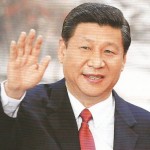China
China champions “four consciousnesses,” conforming with Xi

Party officials, lawmakers and media have called for unwaveringconformity with top leader Xi Jinping, ahead of the country’s major political meetings,known collectively as the “two sessions.”
Faithfulness to the core leadership of the Party is characterized by staunch loyalty to “theCommunist Party of China (CPC) Central Committee, [its] General Secretary Xi Jinping aswell as to Party theories, guidelines, principles and policies,” according to a recentcommentary published by Qiushi Journal, the flagship magazine of the CPC CentralCommittee.
It underscored that the “consciousnesses of the ideology, the whole, the core and the line”must be promoted. This concept, dubbed “the four consciousnesses,” was raised earlierthis year at a high-level meeting of the CPC Central Committee.
“The fundamental principle of strengthening consciousness is to follow the ideology,political thinking and deeds of the CPC Central Committee, with Xi as general secretary,”Liu Yunshan, member of the Standing Committee of the Political Bureau of the CPCCentral Committee, said at the spring semester opening ceremony for the Party School ofthe CPC Central Committee.
On the day that the Qiushi article was published, Liu remarked that “conforming with ‘theline’ is a significant political principle,” — it is where the Party’s strength and advantageslie.
The remarks were made ahead of the annual sessions of the National Committee ofChinese People’s Political Consultative Conference (CPPCC), China’s top political advisorybody, and the National People’s Congress (NPC), China’s top legislature.
The two sessions are the most important political events in China, at which political andeconomic development measures are discussed and key policies adopted, including thenew Five-Year Plan (2016-2020).
Adherence to the Party line must feature across all processes and aspects of buildingsocialism with Chinese characteristics, the Qiushi article said.
All of society must be united by a series of important speeches by Xi on the Chinese dreamof national rejuvenation, according to the article.
The Qiushi article also reflected on the important role the Party’s leadership played inleading various development strategies, such as the “Four Comprehensives,” theoverarching strategy for long-term development.
Another strategy — the five development concepts of innovation, coordination, greendevelopment, opening up and sharing — has guided development policy since it was firstraised at a key CPC meeting in October.
Both the Four Comprehensives and the five development concepts were developed by Xiand his team.
Xie Chuntao, a professor with the CPC Central Committee Party School, said that the CPChad also launched a nationwide campaign among its 87 million members, calling on them”to study the Party code of conduct, to study a series of remarks made by Xi, and to bequalified Party members.”
“To study, to accept and to resolutely implement, that is the way China will build amoderately prosperous society by 2020,” he said.
Over the past three years, Xi’s governance theories have been used as a roadmap for thecountry’s development, as the wold’s second largest economy was in dire need ofstructured methodologies to face its reform test.
China is facing slower growth and trying to shift its economy from a focus on high growthto a more sustainable framework.
Xi advocates supply-side structural reform, which will advance economic restructuring byreducing ineffective and low-end supply, and boost productivity by expanding medium-to-high-end supply.
Experts say supply-side reform will be a distinctive feature of China’s economic policies in2016 and beyond.
Xi’s thoughts go far beyond the economic field.
His anti-corruption campaign, to strengthen the 87-million-strong CPC, has drawnworldwide attention. The punishment of senior officials including Zhou Yongkang, BoXilai and Ling Jihua for corruption has shown Xi is determined to make the Party cleaner,media have said.
Xi also launched China’s biggest military reform in decades to make the People’sLiberation Army a stronger and more effective fighting force that maintains absoluteloyalty to the Party.
In the diplomatic sphere, Xi has been advocating a global community of shared future. Aseries of initiatives including the Belt and Road Initiative and the Asian InfrastructureInvestment Bank serve to highlight China’s image as a responsible and active player inglobal development.
Xi’s governance thoughts have been well received overseas, too. “Xi Jinping: TheGovernance of China,” is available in more than 100 countries.
Zhang Zhao’an, an NPC deputy from Shanghai Municipality, said allegiance to Xi is anecessity to reach consensus among the entire nation to promote reform and opening-up.
“While we are handling the complex economic situation at home and abroad, we can notafford to loose direction or force. We must line up with the CPC Central Committee and Xias the core,” said Zhang, vice director of economic research center under ShanghaiAcademy of Social Sciences.
Zhu Yilong, a CPPCC National Committee member and vice chair of the All-ChinaFederation of Returned Overseas Chinese, said the success of the world’s second largesteconomy will not come easily. Stability and people’s unified thinking are imperative toChina’s development.
“Xi has won the support of the people,” he said. “The time is ripe for raising the ‘fourconsciousnesses’.”


